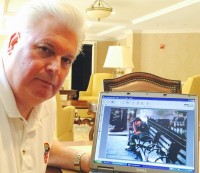Home Guru: Stunning Information About Exercising Fire Safety at Home

Bill Primavera photo
By Bill Primavera
Soon after I moved into my new residence at Trump Park in Yorktown, a neighbor named Dan Potter introduced himself to me as a retired New York City fireman. He said that he had read my column about Fireman Joe who instructed school children about fire safety in the home.
Potter told me not to forget about seniors who have a much higher risk of dying from fire in their homes than the rest of the population and that he had done educational programs on the subject.
This week we got together and I learned many new things, some surprising, including his personal history.
Potter had been at the World Trade Center on Sept. 11, arriving between the times the first and second planes hit the towers. His wife, Jean, was working in Tower 1 on the 81st floor, and for some hours he didn’t know whether she had made it out of the building. After searching at the site and at his apartment just a block away and not finding her, he collapsed on a bench in despair and a passing photographer captured the moment. That photograph appeared around the world and now is featured in the 9/11 Memorial Museum next to Potter’s helmet with his ladder company number “31” which he wore that day.
We started our interview with a quiz. “Do you know why Fire Prevention Week is the first week in October?” he asked.
When I confessed that I had no idea, he informed me that it was enacted by Congress after the Great Chicago Fire, which burned Oct. 8-10, 1871.
He proceeded to talk about fire prevention.
“While most people have smoke detectors in their homes, the batteries are frequently dead,” Potter said. “Or they can be cooking, the alarm goes off, they might take them down, take the batteries out and not put them back.”
But some really surprising information followed. “Citizens over 65 are twice as likely to die in a fire than the general population,” he said. “And once they reach 85, they are five times as likely to die in a fire as the general population, and in the same room in which the fire starts. By that age, a senior’s mobility is slower, they don’t have the same sense of smell, they may be on medication and are not as alert, they may smoke in bed, they may be careless in their dress, be cooking and their clothes catch on fire…”
Potter’s next question caught me off guard. “Have you ever been in a fire?”
“No,” I responded.
“Do you think you really know what fire is?” Potter asked. “Do you think it has sound? Do you know how fast it is? How hot it is?”
I didn’t have answers. He took out his computer and showed me a controlled demonstration of a sofa catching fire. Within 30 seconds there was intense heat. Within one minute there was no way that a person could stand. Within two minutes, the room was engulfed in flames and within three minutes there was total conflagration. All the while, there was silence, not the crackling of wood and the roar we would expect from a romantic fire.
“When we hear stories about expecting a parent to run back into a house to rescue a child, sadly the heat is so intense, so much more than anyone has ever experienced, it just doesn’t happen,” Potter said.
There was one last sobering thought that Potter conveyed to me. When the Avalon, a large New Jersey condominium complex burned to the ground recently, it went very quickly.
“Yes, that was a combustible building, stick-built of wood. In this day and age, it’s a wonder that multiunit buildings of that type are still allowed,” he said.
I wondered about my building.
“It’s non-combustible, made of cement and steel,” Potter said.
It’s scary to consider the number of people who live in multiunit condos and apartments that are of combustible construction. I would urge readers to be aware of escape instructions. For those of you living in single-family dwellings, listen to your children who learn fire safety tips at school. Check every smoke detector in the house and be prepared in an emergency to get out!
For more information about fire safety, visit www.nfpa.org.
Bill Primavera is a Realtor® associated with William Raveis Real Estate and Founder of Primavera Public Relations, Inc., the longest running public relations agency in Westchester (www.PrimaveraPR.com). His real estate site is: www.PrimaveraRealEstate.com and his blog is: www.TheHomeGuru.com. To engage the services of The Home Guru and his team to market your home for sale, call 914-522-2076.

Examiner Media – Keeping you informed with professionally-reported local news, features, and sports coverage.
